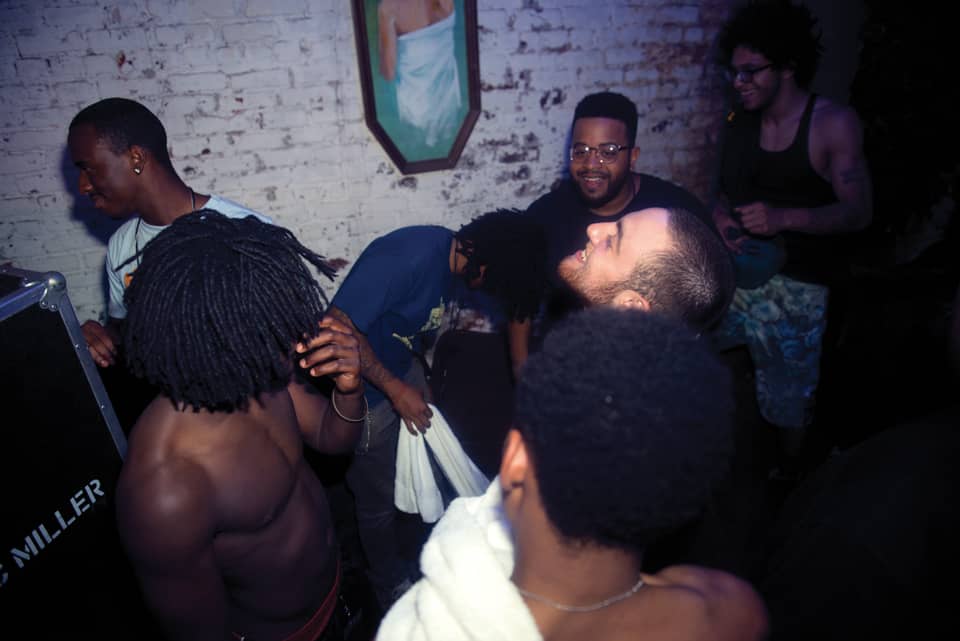From the magazine: ISSUE 87, June/July 2013
Every great artist needs a great team, whether in the form of producers and session guitarists or simply friends offering support. In Footnotes, we ask some of those invaluable assisters to look back at tracks, tours and real life moments that chart the growth of one of the issue’s featured artists. This time around, for Mac Miller, we caught up with Arthur Pitt, who, like the rapper, is a native of Point Breeze, Pittsburgh. Pitt joined Rostrum Records in 2005 as the first employee after founder Benjy Grinberg, and started mentoring Mac in 2009, a year before he signed.
Mac Miller, The Jukebox: Prelude To Class Clown (Internet 2009)
Mac and I went to the same high school, called Taylor Allderdice—so did Wiz [Khalifa] and so did Benjy. When Benjy and I went there it was a terrible environment. There were gang wars, fights, race wars. It was a melting pot for every neighborhood basically in the city, and it just did not work out. By the time Mac and Wiz were there, it improved some, though. A funny thing is—and this makes me feel old—Mac’s principal went to Taylor Allderdice at the same time as me. When she was principal, she knew I was forging a good relationship with him—a friendship and a business relationship—and she would call me to help make sure he’d finish school, because he was cutting school a lot. Mac knew what he wanted to do. He knew he was gonna be a rapper.
Mac Miller f. Wiz Khalifa, “Cruise Control” High Life (Internet 2009)
By 2009, Mac had put out a couple mixtapes, and he caught everyone’s attention in the city. Wiz was paying attention to him, I was paying attention to him. One night, Wiz, Mac and Benjy were at the studio and they decided to do a song together. That was really the first time Wiz did a verse for a younger person in Pittsburgh. They bonded and they formed a good, solid relationship, so it was an easy transition for them to tour together.
Mac Miller, Blue Slide Park (Rostrum 2011)
Mac is more even-keeled and business-minded than people give him credit for. I think he knew what that album was gonna do. When Blue Slide Park came out, he was on his computer and we were on our devices, and we all watched it shoot right up to Number 1. We had a big party at Katana, this really good sushi place out in LA. We actually just did it again for his new album—we went there for good energy and good luck for the second album.
Larry Lovestein & The Velvet Revival, You (REMember Music 2012)
Some of Mac’s earlier stuff was a little more kid-friendly, and that’s fine at that stage of his career, but he’s growing now, and he’s brave because he’s sharing his growth with everybody. Mac takes his rap shit seriously, and some of the feedback he got from critics about Blue Slide Park really inspired him. He taught himself to be a producer; he learned not only to play more instruments, but to do it better. The kid can do everything now—he’s done a jazz album as Larry Lovestein, which people don’t take seriously enough, but they will. I think he’ll be one of the most sought-after producers—period—in the next couple years.
Mac Miller, “Funkmaster Flex Freestyle” (Internet 2013)
Earlier in his career, Mac might’ve been a little bit more wide-eyed and more inclined to please people, but he’s sharpened his sword a lot. He’s more accustomed to the industry now. When he’s in a group of people, he has an almost Jedi-like aura, and people are drawn to him without him speaking so much. The first time he was on Funkmaster Flex, in 2012—he might not admit it to you, but I’ll say it—he was nervous. This time, he got up there and he sat down. He didn’t talk, he didn’t ask any questions, he didn’t say anything to me. I knew that he was on a different level, and he went out there and ripped it. If you watch the video, Flex is speechless. That was a defining moment of his growth.
